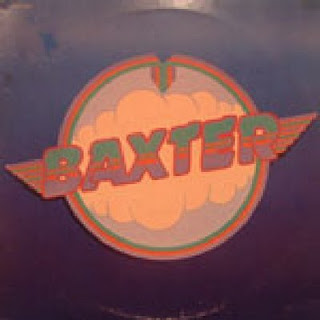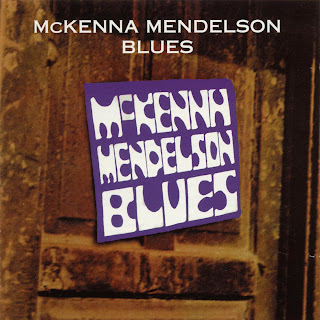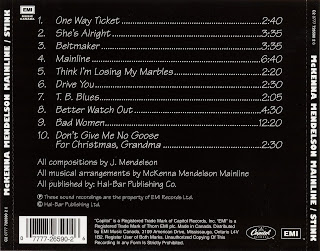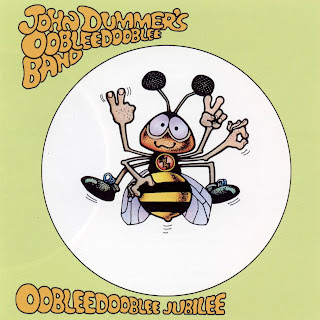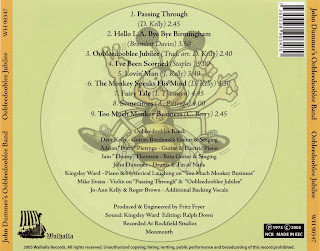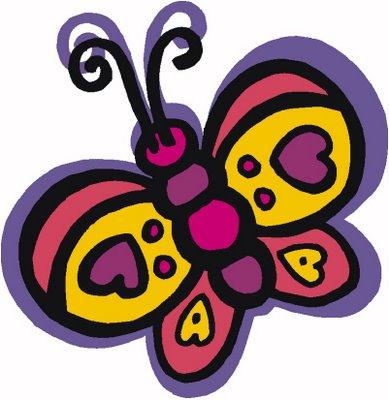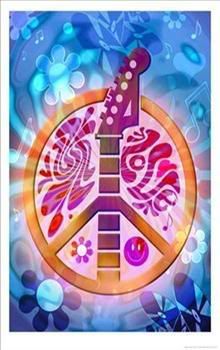C.A. Quintet - Trip Thru Hell (1969)

Below is a Q & A with C A QUINTET mastermind Ken Erwin, who got in touch with me after he and his brother Jim had spotted my review of "Trip Thru Hell" on the Net. I consider Ken Erwin one of the most extraordinary musical talents to emerge during the 1960s and was delighted at the opportunity to shoot some questions his way, including a couple of really detailed ones. This is not a comprehensive interview on the band's history, which can be found in Lost & Found magazine #3 and/or the liner notes to the Sundazed "Trip Thru Hell" reissue. There are also more Erwin dialogues about to be published elsewhere shortly. Take it away, Ken!
Q. Did CA Quintet play much outside the Twin Cities area?
Ken Erwin: Minnesota, Wisconsin, Iowa, Nebraska, North Dakota, South Dakota was the main "touring" area... we were suppose to play a job in Michigan one time... but the bus broke down in Wisconsin and we never made it....
Q. Did the band ever appear on local TV?
Ken: Never on TV that I am aware of… we opened for some "national acts"… Like The James Gang, Freddie Cannon, Kenny Rogers and the 5th Edition
Q. Were any of your releases reviewed or advertised in national magazines such as Billboard?
Ken: I don't think so.
Q. Was there ever talk or plans of going with a major label?
Ken: There was some talk of going with some label in New York… Richard Gottehrer) …. He got involved with Peter Steinberg in the late 60s …. But they were so crooked … I have no idea what if anything was going on with them.
Q. There is a significant leap in creativity from the early CA Quintet 45s to the LP, which sounds like nothing done before within pop & rock music. Was there any particular event or source of inspiration that set you on the path that led to the album?
Ken: Hummm.. I think the creativity was there all along… I think early on we were just trying to get "known" to a point where we could get work… also, the "glamour" and groupies got old pretty quick and we found ourselves searching for something more than playing cover music… also in the late 60s any band worth anything wrote their own music and created their own style.
Q. The music and moods on "Trip thru hell" is quite unlike anything made in rock music up until that point, and often seems closer to modernist classical like Stravinsky or Bela Bartok. Is this music that had influenced you?
Ken:… ya ( good question )… always in the back of my mind I had a feel for classical music.. I got bored with the instruments (orchestration) they used in the classic recordings… but I liked the way the masters had a feel to take their listeners along in a manner that kept their interest and had a good feel as to when it was time to "change things" in their music…. As a side note: Our father told us when he heard that album… joked that it would never sell… as he liked it… he loves classical music.
Q. The cover design of "Trip thru hell" matches the music perfectly. How did this come about; what was the creative process that led to the front cover artwork?
Ken: Rod Eaton… a local drummer who did something at Dove studios (not sure what )… he did the whole thing… we had no input that I remember.
Q. The great use of trumpet on the album is far removed from how brass instruments are normally used within pop and rock music. Were there any rock bands around that you thought used horns in a similar way as you?
Ken: Well… using a trumpet was not in vogue at that time… I doubt if you would have found a trumpet on stage with Jimi Hendrix… there were some R&B bands that did the standard trumpet, sax, trombone… thing ( which I really like )… but I guess we never really thought about it at the time… we just used it to add a different element to our sound…. It probably was a handicap at the time… producers and probably many people in the industry were followers of the trends… and the trumpet was not "cool".
Q. Do you remember approximately what month (in 1969) the LP was released?
Ken: I think it was summer …. I remember lying on the floor of this rat hole of a place I lived and listening to the album the first time I smoked pot.
Q. What is "I shot the king" about -- is it inspired by the Kennedy assassination?
Ken: No…. it was just some vision I had of some daring fool risking and perhaps losing everything … in perhaps the 14th century France …. To get rid of some oppressive King… sacrificing himself for the greater good.
Q. There is an ominous low frequency rumbling that appears about halfway through "Trip thru hell pt 1". Was this just studio ambience, or a deliberate effect?
Ken: Before I go on... I must say I am just amazed at Jim's bass guitar lines... he really was the "heartbeat of the music and the band" ... his playing really is a signature item in my opinion of most of the songs.... His creative bass lines made the songs distinct.... He held us steady... usually from what I know (which is not a lot) the drummer sets the grove and the rest follow... but with three different drummers on the album... Jim was excellent at adjusting to them all and anchoring the group .... I guess I just took him for granted at the time as I heard him everyday.... but it is really true... he was the steady rock of the music ... the foundation to the sound... and the rest of us all just climbed on board.
Well I gave up on the head-phones... the wife is gone, so I put it on the big speakers... broke out some Heineken .. and cranked it up .... It has been a long time, but to the best of my recollection... what you may be hearing is the "bleed through" from other tracks coming in during the drum solo....if you notice after the drum solo it goes back into the theme.... at the time we could have turned off the "rumble" ... but I would imagine we heard it and thought it gave a nice effect so we left it in.
Note: ... maybe I might be the dumbest guy around ... after listening to this thing again after so many years have gone by ... I noticed something that most others have probably already figured that out.. isn't it kind of interesting that the music on "trip thru hell" album has no "sappy love songs" or any other "boy girl relationship" type songs on it ... the songs are about other subjects ...but that would make sense looking back on it from the standpoint of what we were trying to create.
This at a time when 90% of the songs were about "true love", "broken hearts", "sugar sugar" and "baby baby baby " .... I have to laugh as I am sure 30 years later, the song writers of that age would prefer to hear a song about something else .... maybe if we had put some "silly love songs" on there... we would have gone further.... I personally am very glad we didn't.
Q. Any particular reason for "Colorado Mourning" being about Colorado?
Ken: I hitchhiked through there as a young hippie and fell in love with the scenery.
Q. What are the lyrics for "Trip thru hell pt 2", i e: the last 4 lines on the LP? They're hard to decipher on the record.
Ken: The angels came and playedA thousand yearsBut all the glory thereWas washed by tears
Q. What was the reasoning behind the "cocktail jazz" segment during "Trip thru hell pt 2", just before the apocalyptic finale? Does it signify anything in particular?
Ken: A "hiccup in reality" an "interruption" in agreement and expectations …. like an acid trip. It is like when reality tends to get tangled up a bit and things don't fit the pattern anymore.
Q. Where is "Sleepy Hollow Lane" -- is it a completely invented place?
Ken… It is totally in your imagination…. As far as I know.
Q. The vocals on the LP are rather different from the more conventional style on "Mickey's Monkey" and "Blow to my soul". On the LP the vocals often have an introspective, almost listless quality that enhances the eerie mood. Was this new vocal style a deliberate move to match the musical style of the album, or more of a natural progression?
Ken: From my standpoint … what we did with the vocals were intended to blend them into the "landscape" of the music…. To have them be more than an instrument… but not too much more… to be a special instrument that delivers lyrics and some emotion/attitudes … they were meant to be different than the focal point, the way most music is.
Q. Did you mix or filter the vocals on the LP in any unusual way to achieve their "otherworldly" quality?
Ken: Many hours were spent mixing… we would make acetates of mixes… bring them home… listen to them over and over… then go back and remix… until we got it the way we wanted it… we could have "brought them out" more… but again… we wanted them to blend.
Q. Do you remember how many copies of the album that were pressed?
Ken: Well as you may know we were just totally screwed by Peter Steinberg and his "record company"… later on I found a check made out to us that he cashed… I think I recall about 700 pressed… I have heard rumors of more (and less) ….even though they sold out pretty rapidly when it was released… the record company never pressed anymore… even though the demand was there at the time… My brother Jim likes to recall a time when he and Tom Pohling sailed a bunch of them against a brick wall.
Q. Did you perform the "Trip thru hell" material live? If so, was it difficult to recreate?
Ken: Some of the songs we did live … Colorado Mourning, Smooth as Silk, Underground music, Cold Spider…. But the "teeny boppers" wanted to hear Proud Mary…. and that is totally understandable.
Q. Could you say something about the band's development after the album was released? There is a "live" album recorded in 1971...?
Ken: Well we slowly drifted into drugs and lost direction as to where (or even if) we wanted to go anywhere… We never were matched to an audience that wanted what we did… and we got to a point where we didn't care if people liked what we did anymore… it got to be a job… the "live" album was nothing but an after thought… like taking a photo to record an event… we had a tape recorder and just laid mics on the floor…. As a result the live tape it is impossible to mix… ( we tried) there were only 4 of us left… it was a snapshot of the end.
Q. The Minnesota 1960s scene produced an extraordinary number of unusual, highly creative records by bands such as C A Quintet, Bedlam Four ("Hydrogen atom"), T C Atlantic ("Faces"), Calico Wall ("Flight reaction"), the Litter, the Electras etc, that is remarkable even on a national scale. Was this something you were aware of back then? Do you see any particular reason for it?
Ken: I was highly aware of the scene…. For some reason Peter Steinberg involved me at one point with the "management" of Candy Floss records…. As a result I still have a few acetates/tapes around from some of those groups…..I always felt that Warren Kendrick ( spell ? ) was a real talented producer ( the Electra's)…. a lot of the music from the time came out of Dove recording studios…. It was a hot spot.
(info by: CGR)
1. Trip Thru Hell (Part 1)
2. Colorado Mourning
3. Cold Spider
4. Underground Music
5. Sleepy Hollow Lane
6. Smooth As Silk
7. Trip Thru Hell (Part 2)
8. Dr Of Philosophy
9. Blow To My Soul
10. Aint No Doubt About It
11. Mickeys Monkey
12. I Put A Spell On You
13. I Shot The King
14. Fortune Tellers Lie
15. Sadie Lavone
16. Bury Me In A Marijuana Field
17. Colorado Mourning (Alternate Version)
18. Underground Music (Alternate Version)
19. Smooth As Silk (Alternate Version)

Size: 103 Mb
Bitrate: 256 mp3
Artwork Included
Download
